Refine search
Actions for selected content:
58 results
Naturalism is an unexpected ally of theism in tackling the problem of religious diversity
-
- Journal:
- Religious Studies , First View
- Published online by Cambridge University Press:
- 10 November 2025, pp. 1-13
-
- Article
-
- You have access
- Open access
- HTML
- Export citation
AI-mediated mystical experiences
-
- Journal:
- Religious Studies , First View
- Published online by Cambridge University Press:
- 30 October 2025, pp. 1-13
-
- Article
-
- You have access
- Open access
- HTML
- Export citation
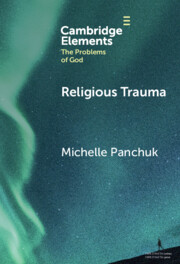
Religious Trauma
-
- Published online:
- 13 December 2024
- Print publication:
- 16 January 2025
-
- Element
- Export citation
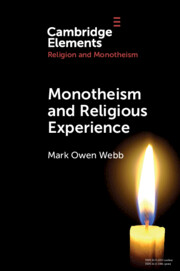
Monotheism and Religious Experience
-
- Published online:
- 26 November 2024
- Print publication:
- 19 December 2024
-
- Element
- Export citation
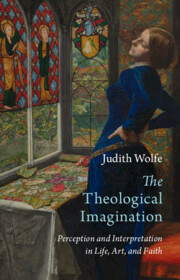
The Theological Imagination
- Perception and Interpretation in Life, Art, and Faith
-
- Published online:
- 09 November 2024
- Print publication:
- 07 November 2024
Perceiving God like an angel
-
- Journal:
- Religious Studies , First View
- Published online by Cambridge University Press:
- 07 November 2024, pp. 1-16
-
- Article
-
- You have access
- Open access
- HTML
- Export citation
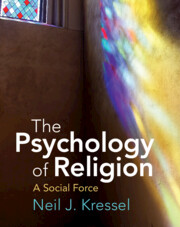
The Psychology of Religion
- A Social Force
-
- Published online:
- 01 November 2024
- Print publication:
- 31 October 2024
-
- Textbook
- Export citation
7 - Religious Development, Religious Experience, and Prayer
- from Part Four - How People Think About and Experience Religion
-
- Book:
- The Psychology of Religion
- Published online:
- 01 November 2024
- Print publication:
- 31 October 2024, pp 267-316
-
- Chapter
- Export citation
9 - Deification as Spiritual Sensation:
- from Part III - The Religious Epistemology of the Cambridge Platonists
-
- Book:
- The Cambridge Platonists and Early Modern Philosophy
- Published online:
- 09 May 2024
- Print publication:
- 16 May 2024, pp 237-268
-
- Chapter
- Export citation
8 - Reason and the Mind of God:
- from Part III - The Religious Epistemology of the Cambridge Platonists
-
- Book:
- The Cambridge Platonists and Early Modern Philosophy
- Published online:
- 09 May 2024
- Print publication:
- 16 May 2024, pp 213-236
-
- Chapter
- Export citation
Introduction
-
- Book:
- Ways of Living Religion
- Published online:
- 07 March 2024
- Print publication:
- 14 March 2024, pp 1-13
-
- Chapter
- Export citation
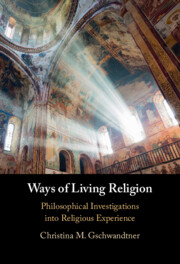
Ways of Living Religion
- Philosophical Investigations into Religious Experience
-
- Published online:
- 07 March 2024
- Print publication:
- 14 March 2024
Chapter 2 - Saving Christianity from Itself
-
- Book:
- The Jewish Imperial Imagination
- Published online:
- 08 November 2023
- Print publication:
- 09 November 2023, pp 48-72
-
- Chapter
- Export citation
Introduction: The Seashell Problem
-
- Book:
- Phenomenology of the Icon
- Published online:
- 17 August 2023
- Print publication:
- 31 August 2023, pp 1-9
-
- Chapter
- Export citation
Chapter 7 - Morality, Religion, and Politics
-
- Book:
- Plato's Moral Realism
- Published online:
- 28 July 2023
- Print publication:
- 24 August 2023, pp 190-222
-
- Chapter
- Export citation
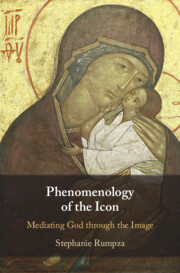
Phenomenology of the Icon
- Mediating God through the Image
-
- Published online:
- 17 August 2023
- Print publication:
- 31 August 2023
A Buddhist's guide to self-destruction: Jñānaśrīmitra on the structure of yogic perception
-
- Journal:
- Religious Studies / Volume 60 / Issue 2 / June 2024
- Published online by Cambridge University Press:
- 17 April 2023, pp. 219-234
- Print publication:
- June 2024
-
- Article
-
- You have access
- Open access
- HTML
- Export citation
Chapter 33 - English Varieties of Religious Experience
- from Part V - Beyond Russia
-
-
- Book:
- Tolstoy in Context
- Published online:
- 05 January 2023
- Print publication:
- 22 December 2022, pp 271-278
-
- Chapter
- Export citation
Chapter 9 - Revelation Shapes Experience
- from Part IV - The Event in Person
-
- Book:
- The Experience of God
- Published online:
- 13 October 2022
- Print publication:
- 20 October 2022, pp 179-197
-
- Chapter
- Export citation
